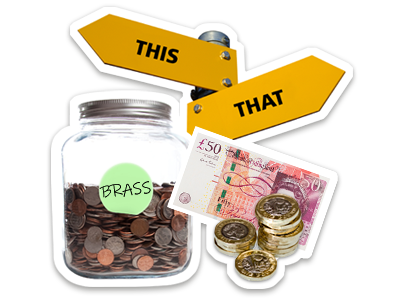Managing my BRASS
When you pay into BRASS, your additional contributions (known as AVCs) are paid into your pot (or Personal Retirement Account). Your BRASS pot is held separate to your main Scheme pension.

The value of your pot, shown on the page, is based on the most recent unit price. You can find the unit price on the prices and performance page.
It will not be the actual value of your pot on that current day but will be the most recent value available.
There may also be circumstances in which daily trading needs to be suspended in order to protect your savings.
If you request an estimate of your DB pension, this will give you an estimated value of your BRASS pot too. You can request an estimate when you log in to your myRPS account.
You can also use the Pension Planner when you log in to your myRPS account. This will show an estimate of how much your BRASS pot and your DB pension may be worth when you retire.
Our videos explain how to request an estimate and use the Pension Planner.
It’s important to check your BRASS investment funds regularly to make sure they're working for you.
The easiest way to do this is to log in to your myRPS account. Go to the myRPS Account menu, then the My Pension section and select the Funds page.
You can invest into one or more of the Lifestyle strategies, where your funds will be managed on your behalf. You can alternatively choose to invest in investment funds, where you would manage your own investments, or a mix of Lifestyle strategies and investment funds.
In both cases, log in to your myRPS account to:
When you select one of these options, you can then allocate the percentage you would like to invest.
You can learn more about all the funds available on the BRASS fund choices page.
You may want to speak to an Independent Financial Adviser (IFA) before making any decisions. You can find more information on the guidance and advice page.
For a step-by-step guide to changing your funds, watch the 'How to switch your RPS investment funds' video.
If you're invested in a Lifestyle Strategy, you should check your Target Retirement Age (TRA), regularly in case your plans change.
Your TRA is the age when you plan to apply for your pension. It’s important because it triggers an automatic process 10 years before you retire to make sure your funds are put into lower risk investments. Your minimum TRA is 50, 55 or 57, depending on when you joined the Scheme and whether you have a Protected Pension Age (PPA). Your maximum TRA is 75. Your TRA could be earlier or later than your Section's Normal Retirement Age (NRA), which is usually between 60 and 65.
If you don't choose a TRA yourself, then your NRA may be used instead, however this isn’t always the case. You can check your NRA in your Member Guide. You can find the Guide when you log in to your myRPS account.
Not choosing a TRA may also mean your pot could be invested in funds that don't fully suit your needs.
You can set, check, and change, your TRA when you log in to your myRPS account. Go to ‘My Pension’, then ‘Funds’ and 'Change Target Retirement Age.'
You can also find out what impact changing your TRA could have on your pension by using the Pension Planner when you log in to your myRPS account.
You can increase, reduce or stop your BRASS contributions at any time. However there may be restrictions on when you can do this if you’re in a salary sacrifice arrangement, which includes contributions to BRASS.
A salary sacrifice arrangement, sometimes known as a SMART arrangement, is one where you can ‘give up’ some of your salary and your employer pays your pension contributions on your behalf instead. Your take-home pay goes up because you are paying lower NI contributions. Ask your employer directly if you have any questions about that.
If you are receiving matching contributions and you reduce the amount you pay, any matching contribution made by your employer may reduce accordingly.
You can speak to your employer to change your BRASS contributions. If you'd like to make a one-off payment (also known as a BRASS top-up), email us at oneoffcontribution@railpen.com and we will take you through the process. For more information on BRASS top ups, please see the short video.
If you’re unsure how much you can pay into BRASS you can use the BRASS maximum contribution calculator when you log in to your myRPS account to get an estimate. You need to ask your employer for an exact figure. You can find more information on the saving more with BRASS page.
You might want to speak to an independent financial adviser about managing your BRASS and making the most of your pension savings. You can find more information on the guidance and advice page.
You should also be mindful of your tax limits when considering how much to pay into BRASS.
You can read more about the Annual and Lump Sum Allowances, as well as more general information about BRASS contributions and the impact of making changes in the Read as You Need guide for BRASS members.
If you’re a Network Rail member, there is a separate guide.

Learn more about the different investment options available to you within BRASS.
Discover how investments work and why they matter to you...